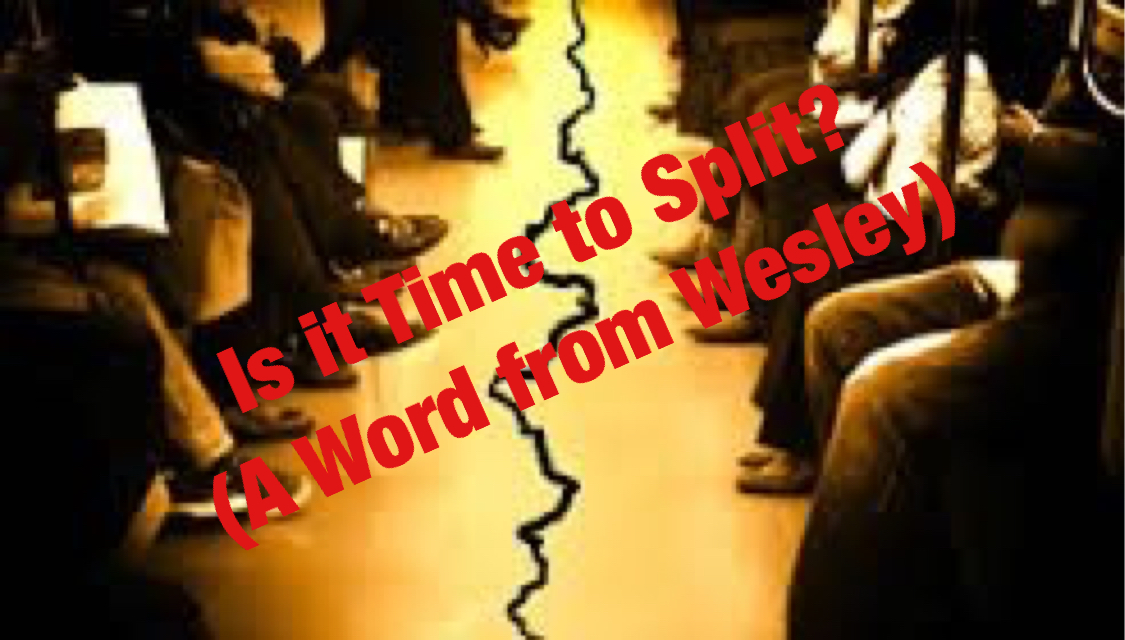A colleague and leader in our conference recently made this comment on Facebook: “It is time for a split. There is no way to avoid it now.” In the light of this sentiment, I want to suggest that we do have a choice. Our choice is not unlike the choice family members make when a loved one makes a decision about religion, politics, or lifestyle that is outside the norm of the family. Options include going “all in” in terms of support and making their decision a primary agenda, or, on the other hand, shunning the loved one or divorcing yourself from them. A third option is choosing to love the other and stay connected, even if there are disagreements. Christians, in various ways, must make this kind of choice every day.
John Wesley gives us great guidance. It cannot be overstated how strongly Wesley advocates some form of the third option, in multiple writings. Perhaps his most direct advice on this topic comes from his sermon, “On Schism.” (I have a paraphrased version that I will post later).
With strong biblical connections, Wesley makes it clear that heresies or factions should never lead to schism, defined as a divorce ‘within” the church, or an intentional splitting of the church. He even shows how differences — even “factions” or “heresies” –serve a positive purpose. It is amid a variety of perspectives within the community of faith that we learn how to love and how to break bread together. Perceived heresies within the church actually makes it possible for us to practice being Christian. That’s Wesley’s take.
For Wesley, it is spiritually dangerous to link heresy with justification for schism, defining heresy as “wrong belief” and justifying schism by claiming “right belief” or “orthodoxy.” This kind of thinking does great harm to the witness of the church. It causes great suffering within the Body of Christ. Taking Wesley’s lead, I am saddened and shocked by how easy it is to deny our complicity in this suffering, and even justify it as a by-product of being able to “win” over the other. As Wesleyans, contention in the Body must spark this kind of reflection and confession.
After these strong biblical proclamations, Wesley does give permission for people to leave a church — to attend or form another church. But this is very different from intentionally creating a split. Leaving can be seen as multiplication rather than division, and can be good for the body as a whole. Yet, even here, Wesley cautions us to make sure that this decision flows from a sense of calling and conscience, and not from any sense of condemnation on another.
Yes, we have a choice! If we are not deeply planted in a community of faith, we have freedom to explore options, says Wesley. However, to those who are deeply planted, Wesley insists that we tend to the care of the whole body in love, peace, humility and mercy. He strongly warns us against laying more stumbling blocks in the way of those for whom Christ died. And that’s what happens when we let rules trump relationship, and positions take precedence over our humble, patience, and gentle love for people. It is simply not up to us to defend God by defining ourselves against others within our own family. That is not the way of Christ.
Yes, we have a choice! From a Wesleyan perspective, this choice starts with us focusing on our own witness and our own growth in holy virtues. Are we living out the love of Christ? Are we doing anything to create a stumbling block for others? As we focus here, Wesley might say that there is no time left to judge others, and no good reason to inflict this kind of harm. Yes, we must make these kinds of choices every day.
Up next: Party Zeal vs. Peacemaking (A Wesleyan Distinction)


I agree with Wesley that schism is not a choice for those deeply planted in Methodism. Patience in prayer will yield the answers to the troubling issues. I believe too many Christians want to forge ahead without being silent to allow the Holy Spirit to work in the hearts and minds of everyone who truly seeks God’s answer.
LikeLike